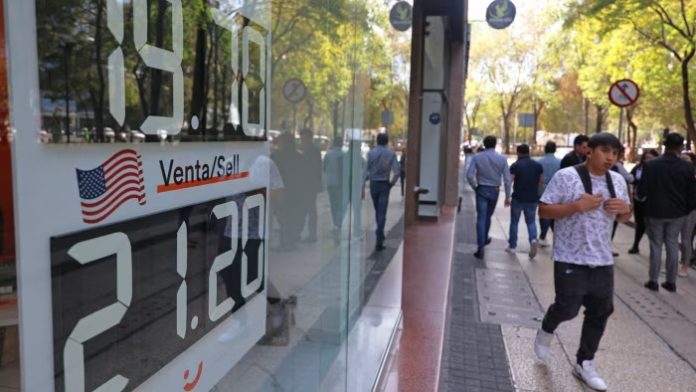Donald Trump’s tariffs shook markets on Monday, with the dollar surging and global equity markets sliding as investors rush to assess how the levies will affect the US and its biggest trading partners.
The US dollar surged as much as 1.4 per cent against a basket of currencies before paring its gains to 1.1 per cent. The Canadian dollar hit its lowest level since 2003. Mexico’s currency tumbled by almost 3 per cent while the euro slid 1.3 per cent.
Asian stocks slid while US stock futures also fell sharply, with contracts tracking the benchmark S&P 500 losing 1.9 per cent and those tracking the Nasdaq 100 sliding 2.5 per cent.
European futures also fell, with the Euro Stoxx 50 down 2.5 per cent. The UK’s benchmark FTSE100 index was on track to open 1.4 per cent lower.
The moves came after Trump on Saturday imposed 25 per cent tariffs on imports from Mexico and Canada, a 10 per cent levy on Canadian energy, and tariffs of 10 per cent on imports from China. He also threatened tariffs against the EU.
Trump admitted in a post on Truth Social, his social network, that there would “maybe” be “some pain” from his tariffs. “But . . . it will all be worth the price that must be paid,” he wrote on Sunday.
Global investment banks warned that the tariffs would hit the US economy alongside the rest of the world. Analysts at UBS and Morgan Stanley forecast that if the tariffs were sustained they could halve US real GDP growth this year — reducing it by more than 1 percentage point.
The US two-year Treasury yield rose by 0.05 percentage points to 4.24 per cent, while the 10-year yield fell by 0.02 percentage points to 4.5 per cent.
“There was some optimism in the market that [tariff threats] were just for negotiation, but the market may have underestimated the determination of the Trump administration,” said Jason Lui, head of Asia-Pacific equity and derivative strategy at BNP Paribas.
Economists have warned that the tariffs are likely to accelerate inflation in the US. “The clearest implication is a stronger dollar,” said Eric Winograd, chief economist at AllianceBernstein. “A long dollar position is the cleanest, clearest expression of the trade war that is now being launched.”
“A strong dollar is a disaster for emerging markets,” said Trinh Nguyen, economist for emerging Asia at Natixis, who said developing economies would be hit by “less appetite for risk assets” and larger dollar-denominated debt burdens.
Japan’s export-heavy Nikkei 225 closed down 2.8 per cent while the Topix fell 2.5 per cent. South Korea’s Kospi benchmark shed 2.5 per cent and the won dropped 1.1 per cent against the dollar to Won1,469.7.
Hong Kong’s Hang Seng index was down 0.5 per cent, led lower by Chinese companies listed in the territory. Mainland China’s stock market is closed until Wednesday.
China’s offshore renminbi, which trades freely, slid as much as 0.7 per cent to Rmb7.37 a dollar on Monday morning before paring back its losses.
Oil prices also climbed in early Asian trade, with international benchmark Brent crude up 0.6 per cent at $76.13 a barrel.
Other commodities that are treated as proxies for Chinese and global economic growth fell. LME copper fell 0.7 per cent to $9,064 per tonne, while nickel and aluminium both fell more than 1 per cent.
Crypto markets also plunged as traders pared back exposure to risk assets. Ethereum, the second largest coin, fell as much as 27 per cent. Bitcoin is down 3.6 per cent to $94,208 per coin.
George Saravelos at Deutsche Bank said the tariff announcements were “at the most hawkish end of the protectionist spectrum we could have envisaged”, and that markets needed to “structurally and significantly reprice the trade war risk premium”.
The Mexican peso has whipsawed in recent weeks as traders have scrutinised the new Trump administration’s announcements for clues about any tariffs.
“If the tariff stays on for several months the exchange rate will reach new historic highs,” said Gabriela Siller, chief economist at Mexico’s Banco Base, referring to the number of pesos per dollar. “If the tariff stays on it will be a structural change for Mexico . . . and Mexico could go into a profound recession that would take years to come out of.”
Economists at Morgan Stanley said the tariff announcements and implementation had come faster than expected, warning that the risk of retaliatory escalation from Beijing was “high”.
Source: https://www.ft.com/content/33ffe193-df55-4fc9-849b-96ccb0d50aaf?shareType=nongift





